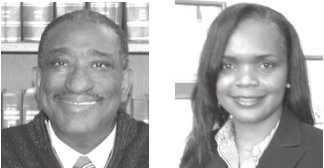Michigan State University says that Lansing Mayor Virg Bernero paid for game tickets for himself and his wife to the 2014 Rose Bowl, contradicting a claim in a federal racketeering lawsuit against him and Joel Ferguson, the chairman of the MSU Board of Trustees.
The lawsuit was filed against them in September by Christopher and Leo Jerome, who were originally partners with Ferguson in the $380 million Red Cedar Renaissance development project on Michigan Avenue.
“For the 2014 Rose Bowl, I’ve confirmed Mayor Bernero was sold two tickets via the president’s office in the stands,” said Jason Cody, an MSU spokesman.
However, the Berneros did receive special treatment. Besides being able to buy tickets through President Lou Anna Simon’s office, they were also allowed to visit the MSU suite at the Rose Bowl in Pasadena to witness MSU’s 24-20 victory over Stanford University.
Cody said there was no cost to enter the suite to visit trustees and other dignitaries.
In the lawsuit, the Jeromes contend they were improperly cut out of the Red Cedar golf course redevelopment project as a reward from Bernero to Ferguson for political favors. It also alleges Ferguson has paid for numerous other items for both the mayor and his wife.

Ferguson has said he could not work with the Jeromes, which led to their removal.
The federal lawsuit also alleges that Ferguson paid for the Berneros’ Rose Bowl trip.
In an emailed statement, Bernero said: “Anyone who claims that Joel Ferguson paid for our trip to the Rose Bowl is mistaken. I paid for it myself as a Christmas gift to my wife,” Terri.
Former Michigan Attorney General Mike Cox, who is representing the Jeromes, declined comment.
The allegations may be fueled, at least in part, by Ferguson himself.
“He told us he paid for that trip,” Lansing City Councilman Jody Washington said, referring to an Oct. 27 meeting with him and Councilwoman Carol Wood on the Red Cedar Renaissance project.
However, Wood could not collaborate Washington’s recollection.
Ferguson denied he’d made such claims.
“Why would I say that?” he asked. While Ferguson may not have paid for the Berneros’ tickets, he has provided MSU sports tickets to other politicians and public officials, apparently at his own expense. In doing so, he has apparently done nothing illegal or unethical by MSU standards.
But that may not be true of at least two recipients, Derrick Quinney and Janene McIntyre. Both were city officials when Ferguson gave them tickets, but neither reported the tickets on annual disclosure forms, as required by the City Charter.
Quinney, who served on the Lansing City Council as an At-Large member from 2007 until 2015, confirmed he accepted tickets to sporting events from Ferguson and that he failed to report them. He resigned his city position when he was appointed Ingham County register of deeds last year. He was elected to the post in November.
Quinney denied that the gifts were attempts to influence him. He said Ferguson had coached a youth football team he played on and the two had remained lifelong friends.
“If I have to file new information to rectify this, I will,” he said.
McIntyre, the former city attorney, had also accepted an undetermined number of tickets from Ferguson, the developer confirmed. However a review of McIntyre’s disclosure forms found she failed to disclose the tickets. It is possible she did not receive enough tickets to trigger the $500 reporting threshold, but Ferguson declined to comment any further.
As a trustee, Ferguson is given tickets to MSU sporting events and the Wharton Center to distribute as he sees fit. The university, in turn, issues 1099 federal income forms to trustees for the face value of the tickets each has received over a year. The trustee is then obligated to pay income tax on the value of the tickets. The only time that does not apply is if the trustee identifies the ticket distribution as a university business expense, in which case it is not tabulated in the 1099 income document, said Cody.
Cody said in the last three years Ferguson has not claimed any tickets as business expenses and has thus been issued 1099s for the value of the tickets. He declined to disclose how much those tickets were worth.
Ferguson said he does not see what the fuss is about.
“No one feels it but you,” Ferguson said Thursday in an interview. “I don’t think it moves the needle on anything. I’m not going to discuss any tickets with anyone, ‘cause I haven’t done anything improper.”
Ferguson said “it’s on them” — elected and appointed officials — for failing to disclose the tickets.
He said administrators and trustees pass out tickets to various sporting events “all the time.” He noted that on any given home game, many lawmakers have taken free tickets, including the governor and attorney general as well as senators and representatives. There is no state law requiring disclosure of these gifts to state lawmakers, who appropriate the university’s budget. “It’s a non-issue.
It’s a non-event. We do it openly,” Ferguson said. When asked why MSU officials had not released the list of recipients, even though it had been requested, he said officials were “offended” by the questions.
Keith Kris, chairman of the Lansing Board of Ethics, said he was surprised to learn that Quinney had failed to disclose the gifts. The board’s authority is limited, however, he said.
“We cannot instigate investigations,” he said. “We rely on citizen complaints and reports in the media to do that.”
He noted that the board started such an inquiry into interim City Attorney Joseph Abood earlier this year, but reluctantly dropped it when he was not forwarded as the final selection for the post. Abood came under scrutiny when City Pulse reported he was supervising his own daughter as an employee in the City Attorney’s Office and that his former family law firm was a preferred outside legal counsel provider for the city. His disclosure form when he was appointed to the interim post showed he was receiving residual payments from the firm.
“Some of us were very, very troubled by that,” Kris said. “But once he was not the interim, nor the city attorney, we did not have the ability to continue. Many of us believed it was unfair that some city employees, like police officers, have to disclose any outside income source, while others don’t.”
Support City Pulse - Donate Today!
Comments
No comments on this item Please log in to comment by clicking here